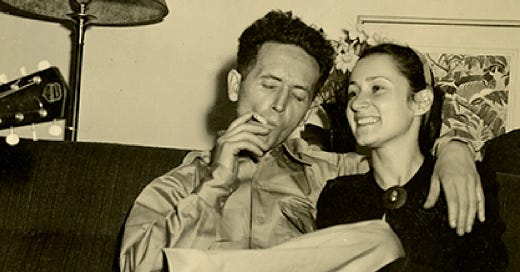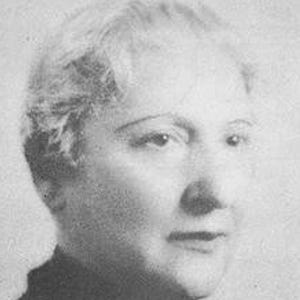Woody Guthrie says “Happy Joyous Hanukkah”
What do you think of when Woody Guthrie comes to mind? The Dust Bowl Ballads? An iconic rambling Okie who sums up a slice of America? His song “This Land is Your Land”? Or his labour movement songs like “Union Maid”?
Woody was a prolific songwriter who soaked up the experiences of the people he came across. He wrote so much material that much of it was never put to music, or it was ephemeral, and the lyrics sometimes survived but the tunes are lost to history. It’s in that category that a raft of Woody Guthrie’s Hanukkah and other songs were unearthed in notebooks in his archive a few years ago and significantly his connection to a Jewish world that had been lost from memory.
Woody Guthrie arrived in New York City in 1940 after years of wandering and songwriting. He quickly found a home among left-wing folk musicians like Leadbelly and Pete Seeger. It was here that Guthrie's life took a turn that has been largely absent from accounts of his life. Through his Jewish wife, Marjorie Mazia Greenblatt, a dancer with the Martha Graham Dance Company, he became deeply connected to the Jewish community.
Marjorie's mother, Aliza Greenblatt, who Woody affectionately called “Bubbie,” lived across the street from their Mermaid Avenue home on New York’s Coney Island peninsula – an area with a vibrant Jewish community – and introduced Guthrie to Jewish culture, history, and traditions. Like Guthrie, Greenblatt wasn’t a native New Yorker; she was born in Bessarabia in what is now Ukraine. She was a socialist Zionist who had played a leading role in various organisations, including at national level in the United States: Greenblatt made a failed attempt to settle in Palestine in 1920 due to the harsh conditions there.
The folk singer and the Yiddish poet
Guthrie and Greenblatt may have come from distant places but they had a lot more in common than might have appeared at first glance. Greenblatt was also a political activist and campaigner against fascism and advocate for workers' rights and union organising. And she was a renowned songwriter and poet whose works were widely published. Except hers were published in another language: Yiddish.
Greenblatt played a major role in the Guthrie family life, looking after the grandchildren and having the family over for Friday night Shabbat dinners. Shortly after Israel was founded in 1948 she made another failed attempt to live there, returning to New York after a year to help with the grandchildren as Guthrie’s health declined and he was diagnosed with the degenerative disease Huntington’s Chorea.
Guthrie was fascinated by the Jewish life he saw around him on Coney Island, the people and the bustle of community life. He learned everything he could about the Jewish people and took several courses on Judaism at Brooklyn Community College. He wrote songs about Jewish holidays like Happy Joyous Hanukkah, the struggles of the Jews, the Holocaust and Jewish children’s songs.
Greenblatt and Guthrie developed a professional relationship and shared their experiences, poems and lyrics. He wrote songs that came directly out of the relationship that were both personal and political; he clearly identified the Jewish struggle with that of his fellow Okies and other oppressed and disenfranchised peoples.
Guthrie wrote most of his Hanukkah songs over a five-day period one December as he was booked to sing at children’s Hanukkah parties in assorted Jewish community centres later that month. They are mainly child-friendly ditties that anyone familiar with Guthrie’s other children’s songs would easily recognise as in his style. Some had a more serious vein though and while most of the tunes have been lost in the midst of time Guthrie did record two of his Hanukkah songs for Moses Asch’s Folkways Records label in 1949. One is a twenty-verse song called The Many and the Few. It begins with Cyrus' decree allowing the exiled Israelites to return to Canaan, then moves on to Ezra reviving Torah learning. The song continues with the stories of Hannah and her seven sons, the Maccabees, Judah Maccabee's heroism and military victories, the rededication of the Temple, and the miracle of the one night’s worth of oil that kept the lamp burning for eight.
The song also has a socialist Zionist influence that Guthrie surely gained from Greenblatt as the second verse shows:
We’ve sung and danced o’er the hot rocky roads
Back to Eretz Yisroel’s land
We worked with plow and rake and hoe
And we blessed the works of our hands
Arlo Guthrie’s Hootenanny Bar Mitzvah
Woody’s son Arlo Guthrie, who became a famous singer in his own right, most notably with the album Alice’s Restaurant, had a bar mitzvah which is a whole tale in itself. Woody had to be taken from hospital where he resided due to his degenerative illness for an unconventional “Hootenanny Bar Mitzvah” to which many of the folk musicians of the day attended.
Perhaps the most interesting bit is that Arlo had what he described in a newspaper interview as a “sweet young rabbi” giving him his Hebrew lessons in the run-up to the event. The rabbi was Meir Kahane who later became infamous as the founder of the extreme-right wing Jewish Defence League and Kach political party in Israel. Arlo joked: “Rabbi Kahane was a really nice, patient teacher, but shortly after he gave me my lessons, he started going haywire. Maybe I was responsible.”
Friend of the Jewish people
Guthrie’s daughter Nora, who runs the Woody Guthrie Archives, is keen to challenge the common perception of Woody as solely a Dust Bowl balladeer. He spent more years in New York than anywhere else, observing the people around him and wrote a lot of material in that period.
Long before Guthrie’s marriage he had close friendships with Jewish people, who were fellow political activists, singers and writers. Jews were so embedded in the American left that it is hardly surprising, especially in New York. His manager was Harold Leventhal a Jewish former union organiser who had been sacked for his activities.
Guthrie’s biographer Will Kaufmann says that when he looked through the archives:
“I pored over his bitter writings on the Shoah, such as his excoriation of Ilsa Koch, the so-called “Beast of Buchenwald.” I learned of his contempt for Churchill and the British Empire in the context of the birth of the State of Israel, which he steadfastly championed.”
“I read of his vision forged in the immediate wake of the anti-Semitic, anti-black, anti-communist Peekskill Riots against Paul Robeson in 1949, which he had personally witnessed. With the atrocities of Peekskill still resonating in his head when he moved into Fred Trump’s Beach Haven complex the following year, Guthrie sought a united front of Jews and African Americans to battle against the housing project’s de facto color line.”
Til’ all of our enemies fall
Every Hanukkah, for eight days in December Jews around the world celebrate the victory of Judah Maccabee and his followers over their oppressor Antiochus IV in what today would be described as an act of national resistance against foreign oppression. As we witness the greatest rise in antisemitism worldwide since the rise of the Nazis I will give the final word from Guthrie’s song the The Many and the Few:
My name is Judah, the Maccabee
By the name of the hammer I’m called
We’ll pray to God before every fight
Til’ all of our enemies fall
You can listen to Woody ‘s Folkways recording of the song here.






